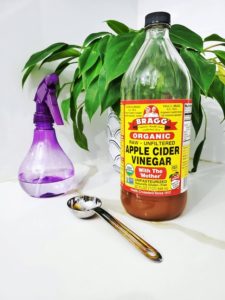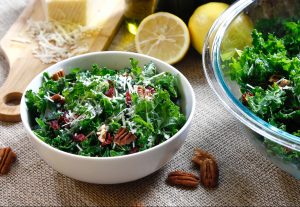 Can a food be an amazing flavor enhancer while helping you control blood sugar and lose weight?
Can a food be an amazing flavor enhancer while helping you control blood sugar and lose weight?
YES! Vinegar is a perfect example!
 Last week, we told you about the life-changing habit of making your own salad dressings, which often include vinegar as an acid. This week, we want to share with you the health benefits of vinegar!
Last week, we told you about the life-changing habit of making your own salad dressings, which often include vinegar as an acid. This week, we want to share with you the health benefits of vinegar!
For thousands of years, people have used vinegar not just for cooking, but also to treat a variety of ailments. And, low and behold — studies show there are plenty of important health benefits we all should know about!
What is vinegar?
The word vinegar comes from the French word “vin aigre,” meaning sour wine. In ancient times, the people of Babylon, China, Middle East and Greece used vinegar as a digestive aid, antibacterial balm for wounds, treatment for coughs, and a drink to boost strength and wellness. Legend claims that vinegar’s discovery came when a forgotten wine was left in storage for months, causing it to ferment and sour.
How is vinegar made?
Vinegar is a combination of acetic acid and water and involves a 2 step fermentation process. The yeast feeds on the sugar or starch from a plant food such as fruits, whole grains, potatoes or rice, and then the liquid ferments into alcohol. Then, the alcohol is exposed to oxygen and the acetic acid bacteria ferments again over weeks or months, forming vinegar.
Why use vinegars?
 The acetic acid is responsible for the flavors and smells we recognize in vinegars. Although vinegars contain only trace amount of vitamins and minerals, they are very low in calories, and do contain beneficial antioxidants (which fight damage in our bodies), amino acids (which help cells function), and polyphenolic compounds (which help prevent disease).
The acetic acid is responsible for the flavors and smells we recognize in vinegars. Although vinegars contain only trace amount of vitamins and minerals, they are very low in calories, and do contain beneficial antioxidants (which fight damage in our bodies), amino acids (which help cells function), and polyphenolic compounds (which help prevent disease).
- Better digestion and weight control! Because of the fermentation process, vinegars contain probiotics, the health promoting bacteria which aids digestion and weight control because they help you feel full longer.
- Lower blood sugar levels! Studies have shown that adding 2 tsp of vinegar to a meal may improve blood sugar control by lowering insulin resistance and improving the action of insulin in diabetics.
- Help your arteries! The acetic acid and polyphenols in apple cider vinegar can help balance triglycerides and improve cholesterol.
Keep in mind, if you consume highly processed unhealthy foods, simply adding vinegars to your routine will NOT magically solve everything. But, vinegars do have the perfect place in a healthy diet, especially because they pair perfectly with REAL foods! (Obviously, we are not talking about adding them to ice cream!) Plus, most vinegars are free from sodium and sugar — which makes them ideal to flavor foods. It’s best to consume a variety of vinegars because there are different antioxidants in different vinegars and they really do complement each other.
How do you enjoy vinegars?
Vinegars can be used in homemade dressings, as marinades, in sauces, and when roasting vegetables. Here are some incredibly flavorful ideas:
 Massaged Kale Salad
Massaged Kale Salad- Salt and Vinegar Roasted Sweet Potatoes
- Balsamic Shredded Brussels Sprouts
- Crunchy Coleslaw
- Cabbage Apple and Pear Salad
- Warm Winter Vegetable Salad
- Bulgogi
- Maple and Walnut Salmon
- Slow Cooker Curried Butternut Chili
What are the different types of vinegars and does quality matter?
White distilled vinegar: made from fermented grains and ideal for pickling because of its neutral taste and color. Grandma must have been onto something…white distilled vinegar is a very popular and inexpensive choice for cleaning (because it’s acidic, it helps cut through grease and grime)!
 Balsamic vinegar: made from fermented whole processed grapes. Check the ingredient label…some inexpensive balsamic vinegars include wine vinegar mixed with caramel coloring and sweetener. If the label includes “grape must,” which is the juice from the crushed grapes, that is a good thing, especially if it the first or only ingredient. When it comes to balsamic vinegar, typically the more expensive, the better the balsamic. And, longer-aged balsamic will provide a more intense and smooth flavor. So, save the pricier version to send the flavor over the top for salad dressings, and use the more moderately priced balsamic vinegars in cooking. When balsamic vinegar is simmered into a thick sauce it is called “reduction.”
Balsamic vinegar: made from fermented whole processed grapes. Check the ingredient label…some inexpensive balsamic vinegars include wine vinegar mixed with caramel coloring and sweetener. If the label includes “grape must,” which is the juice from the crushed grapes, that is a good thing, especially if it the first or only ingredient. When it comes to balsamic vinegar, typically the more expensive, the better the balsamic. And, longer-aged balsamic will provide a more intense and smooth flavor. So, save the pricier version to send the flavor over the top for salad dressings, and use the more moderately priced balsamic vinegars in cooking. When balsamic vinegar is simmered into a thick sauce it is called “reduction.”
Rice and Rice Wine vinegar: made from fermented rice or rice wine and often a staple in Asian-style dishes. Pay attention to what you are getting – some rice vinegars are “seasoned” and have added sugar and salt.
Wine vinegars: made from red or white wine and can be used interchangeably. Some recommend selecting wine vinegars like you are selecting wine. Read the labels and if there is a wine region you like, chances are, you will like the vinegars made from those wines. Most of the time, if you are cooking with wine vinegars, a moderately priced brand will work fine.
Champagne vinegar: more light and delicate, and made from champagne.
Apple cider vinegar: made from the liquid of crushed apples. Apple cider vinegar typically has a lower acidity, with a subtle apple flavor.
 Apple cider vinegar with the “mother” is simply unrefined, unpasteurized, and unfiltered. The “mother” includes strands of proteins, enzymes and beneficial bacteria that give apple cider vinegar a murky appearance. For this reason, many store-bought apple cider vinegars have the “mother” removed, even though it provides great health benefits. So, be selective and choose an option that includes “the mother.”
Apple cider vinegar with the “mother” is simply unrefined, unpasteurized, and unfiltered. The “mother” includes strands of proteins, enzymes and beneficial bacteria that give apple cider vinegar a murky appearance. For this reason, many store-bought apple cider vinegars have the “mother” removed, even though it provides great health benefits. So, be selective and choose an option that includes “the mother.”
We feel it’s best to simply include apple cider vinegar in dressings and in your REAL food meals, but you may come across recommendations to drink 1 Tablespoon of it in 8 oz of water on a daily basis. (Keep in mind, apple cider vinegar should not be consumed straight out of the bottle, it should be diluted or it can burn your mouth and esophagus, and can erode teeth enamel as well.)
Flavored vinegars: made when wine vinegars are infused with fruit purees or herbs to create unique flavors.
 Overall, with vinegars, there is truth to the the saying, “you get what you pay for.” If you aren’t already, start paying attention to labels, and try different types and prices, and find what you like best. Enjoy including a variety of vinegars into your REAL food meals — and reap the health benefits too!
Overall, with vinegars, there is truth to the the saying, “you get what you pay for.” If you aren’t already, start paying attention to labels, and try different types and prices, and find what you like best. Enjoy including a variety of vinegars into your REAL food meals — and reap the health benefits too!
And, then once in a while, splurge on a really good aged balsamic vinegar and taste the difference — you won’t regret it!
What are your favorite vinegars?
Please share with us!



Leave A Comment